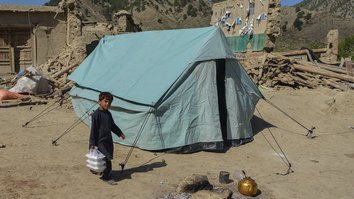GENEVA, Switzerland -- International donors have pledged $2.44 billion in humanitarian aid for Afghanistan, the United Nations (UN) said on Thursday (March 31).
The world body had been seeking a record $4.4 billion in funding this year, with millions threatened with starvation and the economy in free fall.
UN Secretary-General António Guterres said Afghanistan's economy risks falling into a "death spiral" without urgent aid.
But at a virtual conference of donors co-hosted with Britain, Germany and Qatar, just over half of the ambitious target was reached, it announced.
Forty-one nations contributed after the international community was urged not to abandon the Afghan people, even with attention turned to the war in Ukraine and crises elsewhere.
Guterres and others painted a desperate picture of starvation and penury in the meeting.
Some 95% of Afghans do not have enough to eat and nine million are at risk from famine, Guterres said.
"Without immediate action, we face a starvation and malnutrition crisis in Afghanistan. People are already selling their children and their body parts, in order to feed their families," he added.
"The first step in any meaningful humanitarian response must be to halt the death spiral of the Afghan economy."
Britain pledged $380 million in humanitarian funding in the coming financial year from April 1, with at least 50% of the aid targeted towards Afghan women and girls.
Germany is providing an additional €200 million ($221 million), while the United States will put in nearly $204 million in new money.
Between October last year and January, US humanitarian aid for Afghans totalled almost $782 million.
'Hanging by a thread'
UN humanitarian coordinator Martin Griffiths, speaking to the conference from Doha, told how he had been left "speechless" by the level of suffering in Afghanistan.
Life was "hanging by a thread for more than half of the people in Afghanistan", he said.
"We are only just managing to stave off extreme food insecurity, preserving some essential services and barely preventing a complete meltdown of the country.
"The situation is incredibly fragile."
"Sustained, unconditional, flexible funding" is needed to reach more people and to put money back into the economy and into ordinary Afghans' pockets, he said.
Ways of moving the country back into the international banking system will be vital towards delivering humanitarian aid, Griffiths added.
'Peace and stability'
The UN earlier on March 17 agreed to secure a formal presence in Afghanistan.
The UN Security Council resolution, drafted by Norway, passed with 14 in favour, with Russia abstaining.
The resolution allows the UN to continue its work in Afghanistan and includes several strands of co-operation on humanitarian, political and human rights fronts.
"This new mandate for the UN mission to Afghanistan (UNAMA) is crucial not only to respond to the immediate humanitarian and economic crisis but also to reach our overarching goal of peace and stability in Afghanistan," said Norwegian ambassador to the UN Mona Juul at the time.
"The council gives a clear message with this new mandate: UNAMA has a crucial role to play in promoting peace and stability in Afghanistan and to support the Afghan people as they face unprecedented challenges and uncertainty," she said.

![Men receive aid from a charity on the outskirts of Kabul on January 30. [Wakil Kohsar/AFP]](/cnmi_st/images/2022/04/01/34784-000_9xg97w__1_-585_329.jpg)







Although we hear and read about humanitarian aid nowadays, those who deserve it don't get it. It goes to someone who doesn't need it. First, aid is distributed by international aid agencies, which are the most significant contributors. If a hundred families receive a small bag, a ten-liter barrel of oil, a kilo of tea, 7 kg of the bean, etc., these foundations report its aid and spread lies a few times. Aid is usually given to those involved in anti-government activities for the last 20 years. They destroyed bridges, killed innocent people, destroyed roads, and set fire to schools. And in general, I would say that it is given to those who have destroyed Afghanistan for the last 20 years. So, first of all, this aid does not cure the Afghan people, but if it is still given, it should be provided in a transparent manner and to needy families.
Reply1 Comment